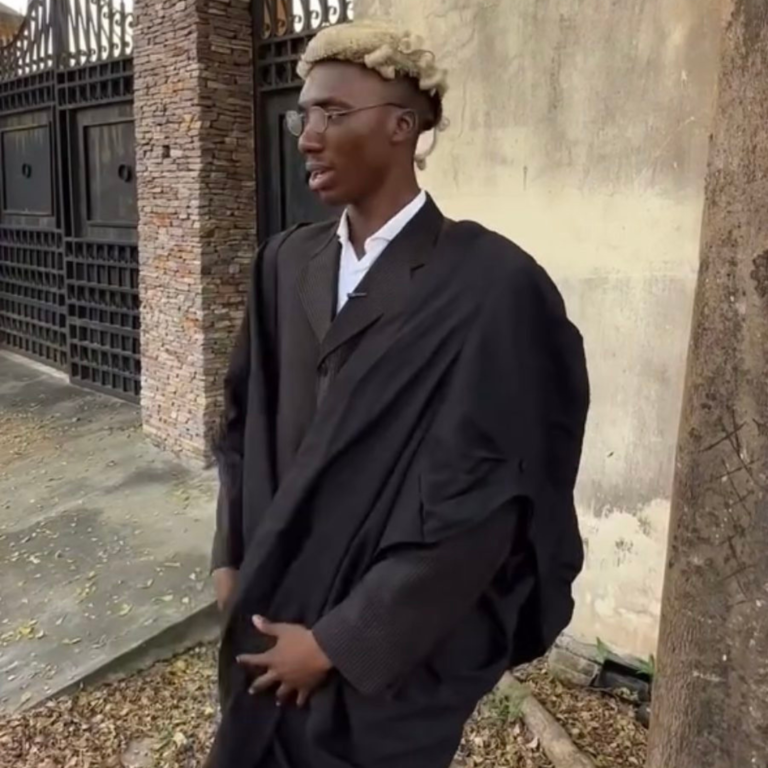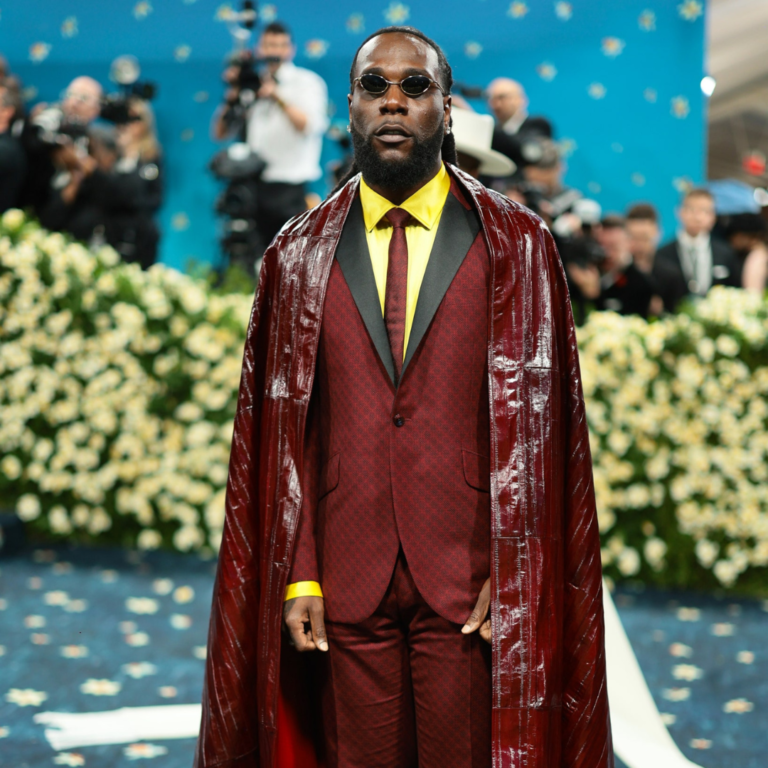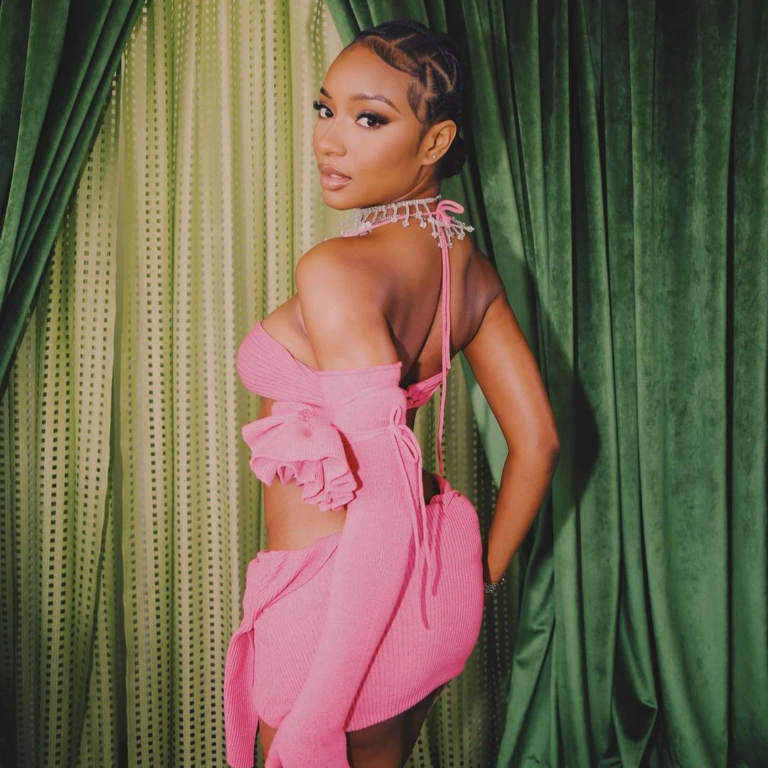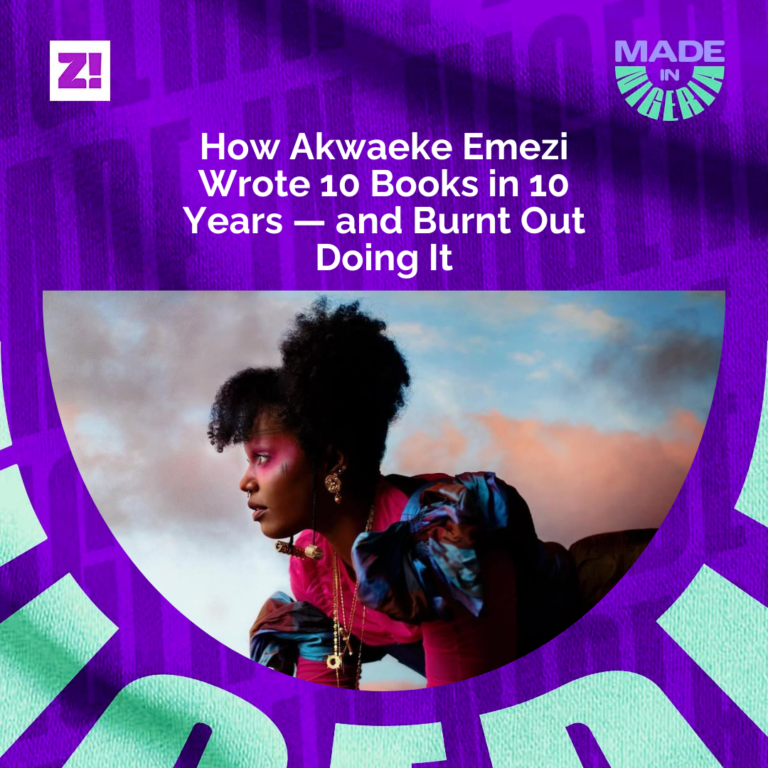For over 25 years, Chude Jideonwo has been at the vanguard of Nigerian media. As a teenager, he published his first novel, His Father’s Knickers. He went on to work on talk shows like Celebrating Jesus (MBI), Inside Out with Agatha, and Funmi Iyanda’s New Dawn.
With his friend Adebola Williams, he launched Red Media Group, the parent company of brands like YNaija, Red Media Africa, The Future Awards Africa, and StateCraft. After surviving a period of depression, he stepped away from his full-time role leading Red Media and later started his show, #WithChude. Joke Silva, Funke Akindele, and Onyeka Onwenu have all been guests. Subscribers pay $9 a month. #WithChude is now under Joy Inc., the company he founded to build “happier, flourishing young Africans.”
On Sunday, he will host #WithChude Live, a live version of the podcast. Guests include Akindele, author Chimamanda Ngozi Adichie, pastor Jerry Eze, the comedian Bovi, and rapper Falz.
In this week’s #MadeinNigeria, he opens up on why he is doing #WithChude Live, the roots of anti-introspection in Nigerian culture, YNaija’s relaunch (next year), and the future of Nigerian media.

This interview has been edited for clarity and length.
Why is this live show, #WithChude Live, important?
There’s a way poverty takes quirks and makes them ugly, and that has happened to the culture in Nigeria. I never blame victims of a system for what they’ve become because of that system. We have an entire culture that sometimes feels airless — no space to breathe, exhale, or rest — it’s all about the hustle, all about “all die na die” and survivalist ideologies.
It’s understandable, but it’s cooking us as a people; we need cultural interventions that allow us to breathe and see ourselves differently — that’s the point of my work with Joy Inc. and #WithChude. How do we fall in love with ourselves, even if we’re noisy, loud, brash, or hustling?
Nigeria’s cultural landscape has lacked that kind of emotional connection, and that’s part of the outcomes I hope for with the work that I do. Over the past few years, Nigeria has had an intense gist culture — and there’s nothing wrong with gist or emotional revelations, but the difference is in how we do it.
On #WithChude, we don’t bully our guests into revelations; we try to present the best version of people, even breaking journalism conventions to ensure guests only answer personal questions if they’re comfortable. All of these things bring a gentler tone to our shared reality, and with #WithChude Live, I want to blow that up to the biggest size. There are many important things happening politically, but let’s also let something beautiful — not just escapism, but something deeper — capture our attention.
I want us to have events about our minds, hearts, and spirits — about wellness and wholeness — where celebrities come, not to talk about beefs, but about emotional health, spiritual life, and overcoming adversity. These conversations often happen in Europe, America, and Cape Town — but we deserve them too; we are humans in the same world. We deserve to have those experiences and to see ourselves in that light.
This is just a small contribution toward shaping the culture into something more wholesome.
Has anti-intellectualism stifled the conversations we have? Why are we here?
There’s anti-intellectualism, which I sometimes call the “abeg-abeg” culture, or the “it’s not that deep” culture. But there’s also anti-introspection. And I think it’s a consequence of poverty — a scarcity mentality — where people believe, with good reason, that the ultimate aspiration is to get as much money and power as possible.
Poverty breeds poverty; economic poverty often brings poverty of thinking. People don’t give themselves the space to feel, to reflect, to respond. Someone once said, “I’ve never seen my mother cry. Any time she’s about to, she holds it back.” That’s not strength — that’s performance, because it’s human to cry. Hillary Clinton and Barack Obama have cried in public, and when someone sees tears as weakness, it shows the performance culture we’ve adopted. One of my guests told me, “In Nigeria, everyone is running for their lives. If you fall down and don’t get up quickly, people will step on you.”
You don’t need to be rich to experience the beautiful emotions of life; in fact, if you have nothing else, that’s when you should reach for what money can’t buy. When people say poor people can’t be happy, I say that’s not true: a man can love his wife even if he’s poor; a sister can trust her brother even in poverty. Emotions don’t depend on physical reality — emotions are in our control.
People are dying of cancer and still find meaning in their suffering. But because of the survival mentality, most of us don’t know there are options — that we can live with grace, with dignity, that we can find meaning in our journey.
Spirituality is supposed to help us, but poverty has infected our spirituality too, so even our spirituality now enables the hustle. We don’t know there are other ways to live this life. The conditions haven’t been created to allow that kind of message to thrive.
That’s why I feel it’s the responsibility of people like myself — people who believe others should know these things — to sell the message, and hope people will buy it.


Is the audience ready to buy this message?
I always remind people — I’m a co-founder of a successful group of media companies. If money were the thing I wanted to focus on, I would’ve continued being the CEO of the Red Media Group.
But something shifted for me. #WithChude comes from my own personal experiences — dealing with depression and everything I learned through that process. So for me, there’s a sense of mission. There’s a reason I’m doing this. And because of that, I want it to succeed.
If you can spend ₦50,000 to drink fake wine at a club for one night — which will wear off in one day — you can spend $9 to watch something that affirms your spirit for a month. That’s what I want people to realise: this is just as important, if not more important, than that.
And if I fail at this? That’s okay too. Because I tried.
My show was inspired by an interview Oprah did with Brené Brown. Oprah is doing her work in America, and it inspired a young person in Nigeria. In the same way, Ken Saro-Wiwa — and I’m not comparing myself to him — can lose his life in the pursuit of something meaningful, and that leads to the Ogoni cleanup 20 years later. One thing I learned from Barack Obama is this: our job is to do what we most believe needs to be done and then pass the baton whether it succeeds or not.
In my case, I’m lucky. #WithChude is a viral success. People are buying tickets for #WithChude Live. But I would’ve been just as comfortable trying and failing. Because I believe it’s important. A conversation that will change your life is worth the investment.
ALSO READ: Akinola Davies Jr. on How to Make a Successful Arthouse Nollywood Film
You tweeted that Governor Babajide Sanwo-Olu of Lagos would attend the event. Why was that important?
We had a whole call about it. Should I post this? And then I thought, “Why are we even having this conversation?” Of course, people are going to criticise me. But we went ahead, because for me, my sense of mission is more important than political noise.
I’ve been doing #WithChude for five years now, and very deliberately, I haven’t invited politicians on my show. It’s not that I don’t have access — I have relationships. I’m literally one degree away from almost any political official in this country. But I chose not to invite them. Why? Because politicians are rarely vulnerable. And if you’re not going to be vulnerable, I don’t need you on my show. I’m trying to do something important. If you’re not ready to participate in that honest exchange, then there’s no need.
That said, politicians do watch the show. They text me after episodes — “This inspired me,” or “That really touched me.” And it’s the same thing happening with #WithChude Live.
Now, Governor Sanwo-Olu wasn’t a guest on the platform. But he is a part of the show. It says something when the most powerful person in the most populous city in Black Africa takes a show about the mind, the heart, and the spirit seriously.
That matters — especially to young people who see power as the ultimate aspiration. If they see someone that powerful taking this work seriously, it tells them, maybe this is worth paying attention to. So to me, that long-term message is more important than the short-term backlash from people saying, “He shouldn’t have been there because of X, Y, or Z.” As long as I’m not compromising on my mission, it’s worth it.
You’ve had very strong friendships over the years. How do you handle and sustain them?
The easiest hack to forgiving others is knowing that you also need to be forgiven. Once you recognise your own irrationality, it becomes easier to extend grace to someone else. Because you know, they would have forgiven you, too, at some point.
I’ve learnt that I’m not a perfect person. That should be obvious, but it isn’t because we look at life through the lens of our own experience. Once I made that mental switch, my friendships became so much easier. I always say this: I haven’t quarrelled with a friend in over five years. Have we had hard conversations? Absolutely. Sometimes I’ve said, “I didn’t like what you did,” or “This hurt me.” But it never escalated into conflict.
That’s partly because I now prioritise peace. I’ve learned to value it. And also because I’ve become very comfortable with myself. I realised that the most important relationship I’ll ever have is the one I have with myself. So, I don’t depend on anyone else for my emotional well-being. One of my idols, Iyanla Vanzant, said, “Whatever it is you’re bringing to me, I’m blessed to have it—and I’m sufficient if I don’t.”
The second part is accepting that I’m flawed. I make mistakes. And if I want grace extended to me, I must extend it to others. That’s what a loving relationship is — a flow of forgiveness, of empathy, of understanding.
Also, I’m an introvert. I have limited emotional energy — and no desire to increase it. It’s actually strategic for me to maintain my relationships, because I have no intention of making new friends. So it’s in my best interest to hold on to the good ones.
I’ve also never experienced betrayal from my close friends. Not once in over 20 years. I’ve never said something to a friend and heard it repeated outside. And that means everything to me. If you talk about your friend in public and then go back to being friends, I don’t understand that. To me, a friendship without trust isn’t a friendship.
What does your relationship with your mother mean to you?
My mother is tailor-made for me. If I didnt love my mother, I wouldn’t talk about her. I don’t do that performance people do. My mother has been a pastor with Mountain of Fire and Miracles Ministries since I was around 21 or 22. But when I turned 18, she said to me, “You’re old enough now to choose your own church. I want you to go to MFM, but you should choose your own church.” That moment was massive. One of the reasons I still have faith today is because my mother allowed me to find it for myself. She didn’t impose it. She gave me space to explore and choose.
When I was 15, I wanted to study Mass Comm. She sat me down and said, “I think you should study law — but of course, I won’t force you.” And then she explained: “If you study journalism, you can’t practice law. But if you study law, you can still practice journalism. Why not give yourself more options?” It was such a reasonable and strategic argument. That’s why I chose law.
There’s another moment I’ve never forgotten. I was about 7 years old. My mother called me and said, “I’m going through a really difficult time in this marriage. But I will not leave — because you are such a sensitive child. And if I leave you for another person to raise you, they’ll break you.” She made it clear she wasn’t staying for appearances or tradition. She stayed because of me. That kind of love — sacrificial, intentional — it stays with you forever.
That’s the kind of relationship I have with my mother. There are no secrets between us. Even when we disagree — and we do disagree, especially on the Bible — I trust her completely. I remember once, as a child, I did something she considered shameful. She caught me. I could have lied my way out of it, but I didn’t. I thought to myself: if there’s anyone in the world who would still love me after this, it’s my mother. Why lie to the one person who loves you the most?
She means so much to me.


What would you say to someone who has no faith?
I think that’s completely fine. My book, How Depression Saved My Life, will be published by Narrative Landscape in August; it’s a memoir and essay collection that proposes a particular Africa-centred philosophy of the world.
There’s a chapter called “Spiritual” that explains this in detail, but I’ll summarise it: if you really read the Bible (which I have, cover to cover, twice), you notice something — you don’t need to find God for God to find you. Samuel just heard a voice at home; Moses was a murderer and fugitive who found God while walking — meaning all the performance (preaching, coercing) is often a misreading of faith, because Jesus said if people aren’t interested, move on.
If you truly believe in the power of your God, you won’t panic when someone says “I’m not interested”; you’ll trust that God can find anyone, in their own time, in their own way. In 2016, during a period of deep depression, I wanted to become an atheist — I read Why God Is Not Great, The Australian Book of Atheism, and more — but by the end, I found God. I met an experience that went beyond logic, that I love and connect with, and even while honouring the brilliance of atheism and agnosticism, I have faith; both things can exist at once.
What happened with YNaija?
I tell people that the YNaija franchise began vertical culture in media in Nigeria because, at some point, YNaija was the mother brand, inspired directly by Gawker.
We had Tech Africa for tech, Enterprise54 for business, The September Standard for fashion, and TeenY for teenagers, but I lost my nerve.
I was doing something so original that I didn’t have models for it, we didn’t have funding, advertisers didn’t understand it, and I felt like this crazy idea nobody cared about, not realising I was pioneering a model the market was about to respond to.
The media content business was dragging the profitability of the group, and an incident — when I published a controversial article for open debate and got backlash — made our clients call and created internal doubts about my leadership.
At some point, I lost my nerve, thinking the culture wasn’t ready and I was prizing my desire to build a complex brand over success, and I always tell young people: don’t assume the people before you know what they’re doing — listen to your gut after examining the data.
If I were going back, I’d have had the confidence to know I was building something beautiful, but the focus on Red Media Africa, StateCraft, and The Future Awards had its benefits: Red is a top PR company, StateCraft works with development organisations like UNDP, and The Future Awards remains the premier youth recognition platform.
Now, there’s a CEO of YNaija, my former assistant Abiola Williams, doing a great job, and we’re in a two-year-long reinvention of the brand that will be unveiled next year — taking our time to find YNaija’s unique place in the culture, building out a team, and returning to take our place without me, because I have other priorities.
The news media business is moving away from advertising to audiences paying for subscriptions and event tickets. What do you think?
I think it’s beautiful — and it’s exactly what I’m doing with my brand. When I was talking to my promoters — and I’m very grateful to them for investing — they suggested I reach out to my sponsors, since I have a wide network. But I said no. That would make us lazy. If I get a sponsor to fund it, I won’t understand how to connect with the audience. I won’t learn how to sell to them. I won’t build a deep connection. We’d be obese with money and dependent on sponsors forever.
We have already had thousands of subscribers for #WithChude for years— an audience we discovered and nurtured over the years. If you find a way to speak to the audience, they will respond. Maybe we get it right, maybe we get it wrong, but this is the future of media: speaking directly to people.
If sponsors want to come, fine. But our energy must go into getting people to buy those ₦20,000, ₦50,000, ₦150,000 tickets. That’s what I want to pioneer. That’s what we are pioneering. There is a real market. We talk too much about Vice, BuzzFeed, Vox, and Call Her Daddy — and too little about Instablog, Tunde Ednut, Linda Ikeji, and Funke Akindele.
Instablog is a legitimate media institution. They may not describe it in fancy terms, but just because they don’t sit at conferences explaining complex business models doesn’t mean they don’t have one. We haven’t spent enough time in Nigeria understanding how the audience decides. But year after year, Kayode Kadum, Toyin Ibrahim, Jade Osiberu do it for films.
The Nigerian audience is difficult — it’s easy to give up. But if you don’t, there are great rewards.

Where do you see yourself in five years?
My campaign hashtag for the year is Oprah’s first son, because Oprah isn’t just a billionaire or media icon, she’s a spiritual icon whose sense of mission inspires me deeply.
I want to create an army of independent content creators across Africa and the world — not telling African stories to the world, but for Africans, for people who want to stay in Mombasa, Malindi, Hermanus, Burkina Faso, and tell native stories to each other.
Over the next five years, I’m collaborating with creators to build an independent media model that tells organic African stories, and we’ve already partnered with CcHub in Nigeria and Kenya, with work expanding to Senegal, Mali, and Burkina Faso.
It’s hard to crack the African content market, but I believe independent creators can do it, and I’m putting my money where my mouth is by investing in content from across the continent.




